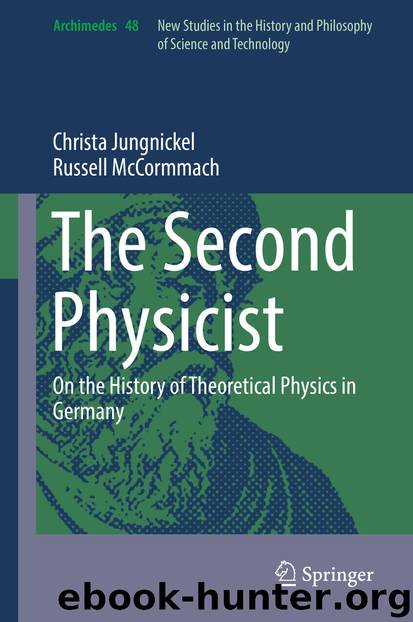The Second Physicist by Christa Jungnickel & Russell McCormmach

Author:Christa Jungnickel & Russell McCormmach
Language: eng
Format: epub
Publisher: Springer International Publishing, Cham
9.3 Weber at Göttingen
In 1866 Weber told the Göttingen curator that it was the “purpose of the [physics] institute that scientific researches be carried out there by various persons, by teachers and students.”94 It was understood that the new assistant in the institute, Friedrich Kohlrausch, would not only direct laboratory practice exercises and take care of the instruments but also do research of his own, with Weber offering him space in the institute and use of its instruments. Kohlrausch was also to assist Weber in his own researches “at all times,” meaning primarily carrying out assignments in the magnetic observatory. Kohlrausch had an office in the institute, where, as Weber’s demanding job description specified, he was to appear at nine o’clock every morning.95
As expected, Kohlrausch published frequently on researches he carried out in Weber’s institute, making him an attractive candidate for positions elsewhere. As he received offers and inquiries repeatedly over the next several years, Weber made efforts to keep him at Göttingen, where he was needed. The first offer came from an agricultural college after Kohlrausch had been at Göttingen for only a few months. To keep him, Weber asked the government to establish a new physics position at Göttingen. To justify it, Weber compared the arrangements there for physics with those for chemistry: whereas chemistry had four extraordinary professors, physics as yet had none, despite the corresponding need in physics for laboratory instruction, which included the chemists’ need for instruction in physics. If Kohlrausch were allowed to leave Göttingen, Weber explained, physics laboratory instruction there would be seriously disturbed. He added, appealing to the state’s concern for its property, that the proper use of valuable instruments could not be guaranteed if Kohlrausch were no longer there to oversee them.96 In Weber’s opinion, the laboratory practice course had “greater importance than all the lectures on physics.”97 He had an even more important reason for keeping Kohlrausch, his research. In this connection, and in keeping with his lifelong way of working, Weber stressed his and Kohlrausch’s collaboration: their “common researches,” he warned the curator, “would not merely be disturbed but completely frustrated.” Weber hoped to carry out a great research with Kohlrausch as he had done with his father, Rudolph, which would bring wide notice to Kohlrausch’s “skill and fine scientific sense.” Weber’s arguments were effective, and Kohlrausch was appointed extraordinary professor at Göttingen in February 1867. Certain that other job offers for Kohlrausch would soon follow, Weber even then reminded the ministry that for their research they needed to be “assured of our collaboration for a longer time.”98
When Kohlrausch expected a call to Würzburg as Clausius’s successor and again when the Zürich Polytechnic offered him Clausius’s old position there (which had since become Kundt’s position), Weber thought that he should be promoted to ordinary professor to hold him at Göttingen, and if that proved impossible that he should be promoted from assistant to director of the physics practice course and co-director of the physics institute and given improved working conditions in the institute.
Download
This site does not store any files on its server. We only index and link to content provided by other sites. Please contact the content providers to delete copyright contents if any and email us, we'll remove relevant links or contents immediately.
| Anthropology | Archaeology |
| Philosophy | Politics & Government |
| Social Sciences | Sociology |
| Women's Studies |
The remains of the day by Kazuo Ishiguro(8964)
Tools of Titans by Timothy Ferriss(8359)
Giovanni's Room by James Baldwin(7315)
The Black Swan by Nassim Nicholas Taleb(7097)
Inner Engineering: A Yogi's Guide to Joy by Sadhguru(6783)
The Way of Zen by Alan W. Watts(6590)
Asking the Right Questions: A Guide to Critical Thinking by M. Neil Browne & Stuart M. Keeley(5751)
The Power of Now: A Guide to Spiritual Enlightenment by Eckhart Tolle(5741)
The Six Wives Of Henry VIII (WOMEN IN HISTORY) by Fraser Antonia(5493)
Astrophysics for People in a Hurry by Neil DeGrasse Tyson(5172)
Housekeeping by Marilynne Robinson(4433)
12 Rules for Life by Jordan B. Peterson(4298)
Double Down (Diary of a Wimpy Kid Book 11) by Jeff Kinney(4257)
The Ethical Slut by Janet W. Hardy(4236)
Skin in the Game by Nassim Nicholas Taleb(4232)
Ikigai by Héctor García & Francesc Miralles(4229)
The Art of Happiness by The Dalai Lama(4118)
Skin in the Game: Hidden Asymmetries in Daily Life by Nassim Nicholas Taleb(3986)
Walking by Henry David Thoreau(3949)
